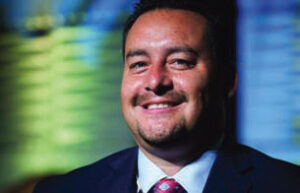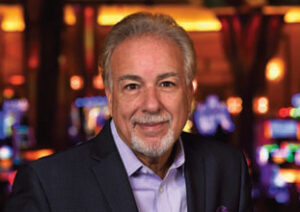
When Covid-19 came to the U.S. in March 2020, states around the country ordered all but essential businesses to shut down to minimize the spread of the virus. Where possible, many companies let staff work from home.
Among the sectors hardest hit by the closures was hospitality, a service industry not considered essential to the public, an industry where most employees cannot work at home.
Casino resorts closed from Las Vegas to Mississippi to Atlantic City and to the far reaches of Indian Country. Gaming and non-gaming revenues tumbled for the two to three months the industry was dark. There were no casinos, no restaurants, no retail sportsbooks and no Luke Bryan singing in the showroom.
There was no money coming in, outside of those few properties with online sports betting and the even fewer offering online casinos.
Turning the Tide
Turning Stone Resort Casino, in upstate New York, wasn’t authorized to offer either virtual option. The resort suspended operations from May 16 to June 10, 2020, a few days shy of three months. It could have ignored the order from Governor Andrew Cuomo to close down; Turning Stone lies on sovereign land owned by the Oneida Indian Nation, and thus is not subject to the edicts coming out of Albany.
The resort could have kept the slot machines humming, the hotel accommodating guests, the restaurants serving meals. But it didn’t.
“It’s worth noting we actually were the first casino in the state to announce we would be temporarily closing… before the commercial casinos,” says Joel Barkin, vice president of communications for the Oneida Indian Nation. During that time, the lone tribal revenue source centered on the two convenience store chains it owns, both classified as essential businesses.
Turning Stone was not unique.
“As recognized by the U.S. Constitution and multiple individual treaties with the federal government, tribal governments are separate sovereigns from state governments,” says Matthew Morgan, chairman of the Oklahoma Indian Gaming Association. State governments have no authority, except that which is granted by the tribes, on reservation land.
Like Turning Stone, Oklahoma’s tribal governments issued emergency health declarations and closed prior to state orders to do so, Morgan says. By March 23, every tribal casino in Oklahoma had shut down.
“While we were not required to follow the governor’s executive orders, given the state of the pandemic at the time, we voluntarily closed on March 16,” says Mike Bean, CEO of Saginaw Chippewa Gaming Enterprises, which operates Soaring Eagle Casino & Resort, Saganing Eagles Landing Casino & Hotel and the Slot Palace & Bingo Hall, all in Michigan. “We canceled our large-scale summer concert series that included Luke Bryan, Keith Urban and Miranda Lambert.”
Tribal property after tribal property shut down, large and small.
Full Stop
The loss of casino revenue stood out, but income from ancillary activities also ground to a standstill.
“Other areas that saw challenges in 2020, with impacts still being felt today, were entertainment and meetings and conventions,” says Jeff Hamilton, president and general manager of Mohegan Sun in Connecticut, one of the country’s largest casino resorts. Mohegan Sun closed March 17, 2020, and reopened June 1.
 “Dipping into reserves put a strain on any business, but tribal leaders’ commitment to their employees and communities was their highest priority.” —Matthew Morgan, chairman of the Oklahoma Indian Gaming Association
“Dipping into reserves put a strain on any business, but tribal leaders’ commitment to their employees and communities was their highest priority.” —Matthew Morgan, chairman of the Oklahoma Indian Gaming Association
Bean says the two-and-a-half month closure had about a 20 percent adverse impact on revenue for the year.
“We mitigated with expense reductions that unfortunately included furloughing most team members,” Bean says.
During the closures, many tribal casino properties in Oklahoma still paid employees to keep them solvent.
“This is just one more way tribes have shown their commitment and compassion for their citizens and their employees,” Morgan says. “Many tribes took on that responsibility by using tribal reserve funds to pay staff, and they did it before they knew if any federal assistance programs were going to be made available.
“While dipping into reserves puts a strain on any business, tribal leaders’ commitment to their employees and communities was their highest priority.”
From the end of May to the end of June, many tribal casinos reopened—with caveats. As with commercial gaming resorts, tribal properties installed a spate of precautions and capacity limitations, limits that were self-imposed.
“We opened up May 29 after putting the safety measures in place so that we could do so responsibly,” Bean says.
The Saginaw Chippewa casinos eliminated smoking. They hired teams dedicated to the continuous cleaning of slot machines and other high-touch surfaces. Every other slot machine was turned off and restaurant capacity was reduced, with social distancing markers installed in appropriate places. Additional hand-sanitation stations and wipe stations were installed.
The properties conducted contact tracing of staffers who tested positive for the coronavirus to determine if the transmission occurred outside of the casino hotels where masks and other protocols may have been ignored.
“A team member who is isolated and tested for coronavirus after having had close contact at work with another team member who tested positive often results in a negative test,” Bean says. “We believe this is due to our mask-wearing requirement and other safety protocols.”
The Michigan tribal casinos produced strong volume through the fall, when a second wave of the pandemic hit, Bean says. The new wave did nothing to dampen the optimism.
Health First
During the time off, Mohegan Sun created an extensive health plan that is still in place.
“Dining and gaming guidelines are able to be relaxed as conditions have improved, though they‘re still in place for the health and safety of everyone,” Hamilton says.
 “As vaccines continue to increase, coupled with continued guidance and vigilance from a health and safety standpoint, we expect the summer and fall to result in significant improvements in our gaming and non-gaming amenities.” —Jeff Hamilton, president and general manager of Mohegan Sun
“As vaccines continue to increase, coupled with continued guidance and vigilance from a health and safety standpoint, we expect the summer and fall to result in significant improvements in our gaming and non-gaming amenities.” —Jeff Hamilton, president and general manager of Mohegan Sun
The tribe developed a comprehensive program with assistance from the Mohegan Tribal Health Department. The plan included what is now commonplace for all casino hotel properties in the pandemic era: mask mandates, temperature scans at all entrances, capacity limits at restaurants, upgrades to the air conditioning system, Plexiglas dividers and a sanitation plan with frequent sanitizer stations.
“We weathered the storm,” Bean says. “We’re cautiously optimistic about the coming summer and fall. With vaccines anticipated to be widely available by this summer we anticipate a gradual return to pre-pandemic business volumes.”
The Chippewa Casinos have set aside some banks of slot machines so guests can play together, while still maintaining banks with every other machine turned off, giving patrons a choice. The salon and spa reopened with appropriate safety protocols in place and valet service could return in mid-June.
“We plan to kick off our summer concert series with Luke Bryan on May 29 with a concert lineup similar to our 2020 schedule,” Bean says.
Pala Casino Spa & Resort near San Diego closed March 15, 2020, and reopened May 27. There was no revenue during the shutdown, CEO Fred Buro says. “Of course, pain was suffered,” he says. “But if the current gaming revenue and trajectory maintain themselves, Pala will continue to experience exceptional performance.”
In recent months, compared against the same months last year, revenue is up. “It’s been accelerated, in part, as a result of stimulus checks being issued,” Buro says.
By late June, Oklahoma tribal casinos had reopened, working in concert with the Centers for Disease Control and Prevention and the Indian Health Service.
“Nothing is of greater importance to the tribes than the health and well-being of the citizens of their nations and non-tribal citizens who live, work and travel within their borders,” Morgan says.
Rapid Rebound
For Turning Stone, being open meant the return of its sportsbook, hotel, restaurants and golf course. Visitation has increased this year, mostly with local and regional patrons.
“We noticed many of our guests who might normally fly someplace for vacations instead booked three to four day trips to Turning Stone and our other properties,” Barkin says. “As more and more people get vaccinated, we’re already seeing guests return in much larger numbers.”
In Oklahoma, tribal casinos also cater to local and regional populations, and don’t depend on a fly-in market, Morgan says. “The ones that are marketed as more of a regional market are drivable for their customers. Others are located in rural Oklahoma, which means they’re the entertainment hubs for the people who live nearby.”
People go to these casinos for fine dining, concerts or to meet up for coffee or brunch, Morgan says. “When we were able to safely reopen and people were ready to get out, our customers were comfortable with enjoying our offerings.”
The initial return of entertainment at Mohegan Sun began in Comix Roadhouse and the luxury lounge, Novelle, both with limited seating capacities.
“The entertainment roster will expand in the coming weeks,” Hamilton says. “We’re really encouraged by recent trends and see a bright rebound on the horizon. We’re very encouraged about the future, and as 2021 progresses, we should see adjustments in the positive direction. As vaccines continue to increase, coupled with continued guidance and vigilance from a health and safety standpoint, we expect the summer and fall to result in significant improvements in key areas both in our gaming and non-gaming amenities, including hotel, dining, nightlife and entertainment.”
Live entertainment will be the last component to come back at Turning Stone, Barkin says. “Based on our guest feedback, we anticipate there will be a tremendous demand for live events.“
 “For us, it’s about leadership to show how a venue can reinvent itself even in a pandemic environment.” —Tom Cantone, president of sports and entertainment for Mohegan Gaming & Entertainment
“For us, it’s about leadership to show how a venue can reinvent itself even in a pandemic environment.” —Tom Cantone, president of sports and entertainment for Mohegan Gaming & Entertainment
At Mohegan Sun, Tom Cantone, president of sports and entertainment for Mohegan Gaming & Entertainment, remembers the frustration of those early days in March 2020.
“I sat in my office surrounded by 8 million square feet of darkness, thinking of ways to stay relevant during this unprecedented time,” Cantone said back then.
He reached out to Viacom with an idea to use the resort’s arena to broadcast events for the company’s sports brands. The result was a residency partnership with Showtime Championship Boxing and Bellator MMA, with a series of fights broadcast live on Showtime and the Paramount Network.
“Tom Cantone and his team have been excellent partners and the venue has suited our unique needs to deliver both boxing and MMA sports,” says Stephen Espinoza, president of Showtime Sports.
While no fight fans crowded the stands, all combatants were still tested and quarantined before each fight, Cantone says; it was truly the first “bubble” to keep athletes safe and allow the matches to continue.
The first event almost brought Cantone to tears. “When I heard them say ‘Live from Mohegan Sun Arena,’ I got a little emotional as I saw my crew and people clapping. I remembered sitting in my office all alone, wishing for this day to come true. And like magic, it did.”
Mohegan Sun later hosted several college basketball tournaments late in 2020, where teams were placed in the Mohegan bubble. They served as the blueprint used by the NCAA to conduct March Madness in Indiana in 2021.
The relationships with Viacom and the college leagues paid off for Mohegan. “It was a combination of a good relationship and a great team to back it up here at Mohegan Sun,” Cantone says. “It’s an incredible endorsement for our team. We found a way to beat the pandemic.
“For us, it’s about leadership to show how a venue can reinvent itself even in a pandemic environment.”
Meeting Expectations
Turning Stone has also developed plans for the return of meetings and conferences, says Barkin. “We made significant investments in enhancing and expanding our meeting spaces, which includes technology upgrades that will allow for more advanced hybrid meetings and live-streaming functions.”
Along a similar line, meetings and conventions were foremost for Mohegan Sun.
“Entertainment and our meetings business become two areas that were unable to operate as normal, though gaming, dining, retail and hotel stays were all able to add to the revenue picture,” Hamilton says. “We were very innovative during the pandemic, however, and safe and successful events were gradually returned under the direction of Mohegan Sun’s vice president of exhibition and sales, John Washko.”
Turning Stone could add online sports betting and online casinos in the not-too-distant future, if the legislature acts. Both elements could soften the blow in similar emergencies in the future. Just ask New Jersey and Pennsylvania.
“Connecticut’s Governor Ned Lamont recently expressed optimism on sports betting and iGaming being possible by the start of football season,” Hamilton says.
Buro is less optimistic as to when the online components will kick in, mostly because of the long path necessary in California.
“As I understand it, the status of sports betting and iGaming in California is that everyone believes it’s going to happen; however, the when, who benefits in the short term, who benefits in the long term, along with regulations and taxes, all remain desperately elusive,” Buro says.
Still, he predicts that “California will have a bill passed within 18 months.”
In Michigan, sports betting is live, both in casinos and online, as is online gaming. Some tribal casinos already offer both options, and the Chippewa tribes should be functioning in that area sometime in 2021, according to Bean.
“We have a very nice venue that we further improved to soon add sports betting with online sports and online casino to follow. We will operate under our own brand to leverage, integrate and grow our existing customer base and retain the proceeds,” Bean says.






